Top Rankings
Catawba County Schools School District ranks among the top 20% of public school district in North Carolina for:
Category
Attribute
Community Size
Largest student body (number of students) (Top 1%)
For the 2025 school year, there are 7 public high schools serving 5,301 students in Catawba County Schools School District. This district's average high testing ranking is 9/10, which is in the top 20% of public high schools in North Carolina.
Public High Schools in Catawba County Schools School District have an average math proficiency score of 78% (versus the North Carolina public high school average of 58%), and reading proficiency score of 61% (versus the 58% statewide average).
Public High School in Catawba County School School District have a Graduation Rate of 86%, which is more than the North Carolina average of 85%.
The school with highest graduation rate is Challenger Early College High School, with ≥95% graduation rate. Read more about public school graduation rate statistics in North Carolina or national school graduation rate statistics.
Minority enrollment is 39% of the student body (majority Hispanic), which is less than the North Carolina public high school average of 55% (majority Black and Hispanic).
Overview
This School District
This State (NC)
# Schools
28 Schools
761 Schools
# Students
15,880 Students
565,764 Students
# Teachers
1,007 Teachers
33,453 Teachers
Student : Teacher Ratio
16:1
16:1
District Rank
Catawba County Schools School District, which is ranked within the top 50% of all 320 school districts in North Carolina (based off of combined math and reading proficiency testing data) for the 2021-2022 school year.
The school district's graduation rate of 86% has decreased from 91% over five school years.
Overall District Rank
#119 out of 325 school districts
(Top 50%)
(Top 50%)
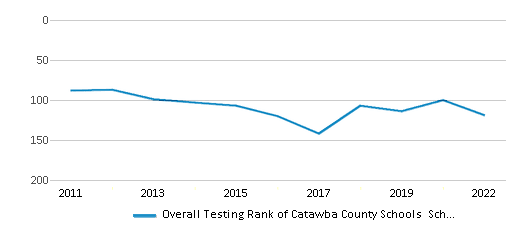
Math Test Scores (% Proficient)
59%
51%
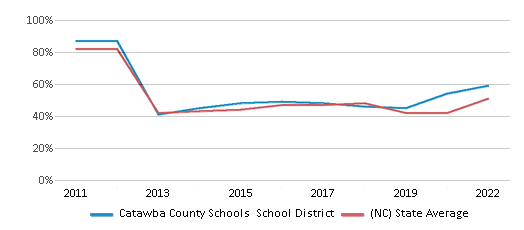
Reading/Language Arts Test Scores (% Proficient)
51%
50%
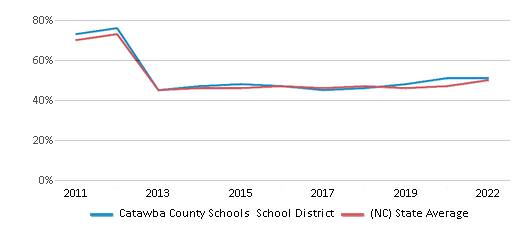
Science Test Scores (% Proficient)
71%
63%
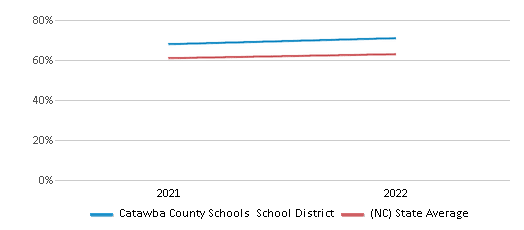
Graduation Rate
86%
86%
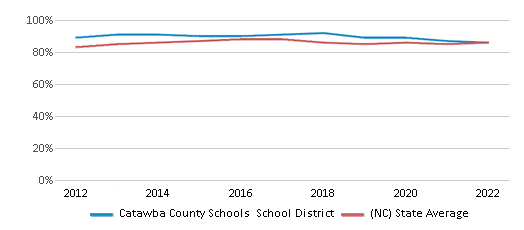
Students by Ethnicity:
Diversity Score
0.60
0.70
# American Indian Students
6 Students
5,772 Students
% American Indian Students
n/a
1%
# Asian Students
1,195 Students
21,293 Students
% Asian Students
7%
4%
# Hispanic Students
3,000 Students
115,235 Students
% Hispanic Students
19%
20%
# Black Students
916 Students
138,700 Students
% Black Students
6%
24%
# White Students
9,530 Students
254,801 Students
% White Students
60%
45%
# Hawaiian Students
9 Students
765 Students
% Hawaiian Students
n/a
n/a
# Two or more races Students
1,224 Students
30,969 Students
% of Two or more races Students
8%
6%
Students by Grade:
# Students in PK Grade:
251
491
# Students in K Grade:
1,086
6,922
# Students in 1st Grade:
1,109
6,949
# Students in 2nd Grade:
1,194
7,207
# Students in 3rd Grade:
1,112
7,125
# Students in 4th Grade:
1,154
7,196
# Students in 5th Grade:
1,137
7,763
# Students in 6th Grade:
1,264
11,146
# Students in 7th Grade:
1,156
12,024
# Students in 8th Grade:
1,183
12,284
# Students in 9th Grade:
1,413
137,976
# Students in 10th Grade:
1,362
126,349
# Students in 11th Grade:
1,299
117,582
# Students in 12th Grade:
1,160
104,750
# Ungraded Students:
-
-
District Revenue and Spending
The revenue/student of $10,638 in this school district is less than the state median of $11,187. The school district revenue/student has stayed relatively flat over four school years.
The school district's spending/student of $10,571 is less than the state median of $11,612. The school district spending/student has stayed relatively flat over four school years.
Total Revenue
$169 MM
$17,307 MM
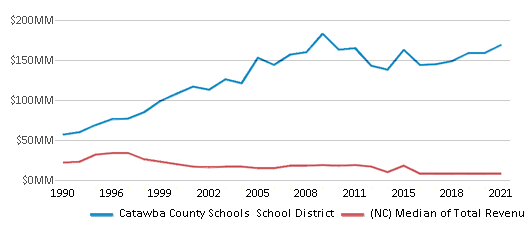
Spending
$168 MM
$17,964 MM
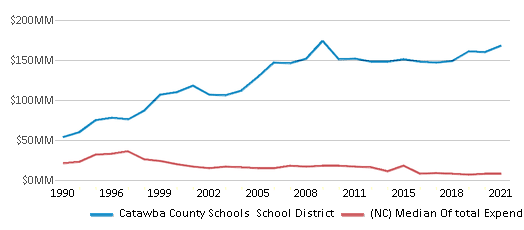
Revenue / Student
$10,638
$11,187
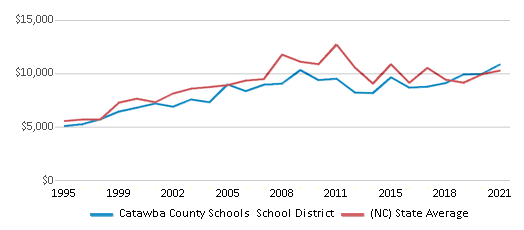
Spending / Student
$10,571
$11,612
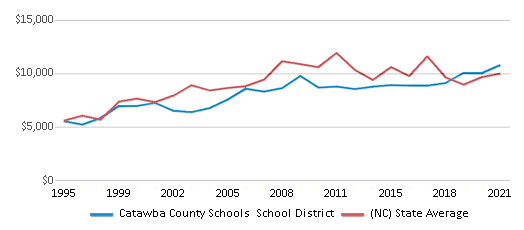
Best Catawba County Schools School District Public High Schools (2025)
School
(Math and Reading Proficiency)
(Math and Reading Proficiency)
Location
Grades
Students
Rank: #11.
Bandys High School
(Math: 85-89% | Reading: 69%)
Rank:
Rank:
10/
Top 10%10
5040 E Bandys Road
Catawba, NC 28609
(828) 241-1471
Catawba, NC 28609
(828) 241-1471
Grades: 9-12
| 923 students
Rank: #22.
Fred T Foard High School
(Math: 75-79% | Reading: 63%)
Rank:
Rank:
9/
Top 20%10
3407 Plateau Road
Newton, NC 28658
(704) 462-1496
Newton, NC 28658
(704) 462-1496
Grades: 9-12
| 956 students
Rank: #33.
Maiden High School
(Math: 75-79% | Reading: 59%)
Rank:
Rank:
9/
Top 20%10
600 West Main Street
Maiden, NC 28650
(828) 428-8197
Maiden, NC 28650
(828) 428-8197
Grades: 9-12
| 879 students
Rank: #44.
Saint Stephens High School
(Math: 75-79% | Reading: 54%)
Rank:
Rank:
8/
Top 30%10
3205 34th Street Drive Ne
Hickory, NC 28601
(828) 256-9841
Hickory, NC 28601
(828) 256-9841
Grades: 9-12
| 1,298 students
Rank: #55.
Bunker Hill High School
(Math: 75-79% | Reading: 50-54%)
Rank:
Rank:
8/
Top 30%10
4675 Oxford School Road
Claremont, NC 28610
(828) 241-3355
Claremont, NC 28610
(828) 241-3355
Grades: 9-12
| 883 students
Rank: #66.
Challenger Early College High School
(Math: ≥50% | Reading: ≥95%)
Rank:
Rank:
8/
Top 30%10
2550 Hwy 70 Se
Hickory, NC 28602
(828) 485-2980
Hickory, NC 28602
(828) 485-2980
Grades: 9-12
| 362 students
Rank: #77.
Catawba Rosenwald Education Center
Special Education School
(Math: ≤10% | Reading: ≤10% )
Rank:
Rank:
1/
Bottom 50%10
403 6th Ave Sw
Catawba, NC 28609
(828) 241-2734
Catawba, NC 28609
(828) 241-2734
Grades: K-12
| n/a students
Recent Articles

What Is A Charter School?
Explore the world of charter schools in this comprehensive guide. Learn about their history, how they operate, and the pros and cons of this educational innovation. Discover key facts about charter schools, including admission policies, demographics, and funding, as well as what to look for when considering a charter school for your child.

10 Reasons Why High School Sports Benefit Students
Discover the 10 compelling reasons why high school sports are beneficial for students. This comprehensive article explores how athletics enhance academic performance, foster personal growth, and develop crucial life skills. From improved fitness and time management to leadership development and community representation, learn why participating in high school sports can be a game-changer for students' overall success and well-being.

February 05, 2025
Understanding the U.S. Department of Education: Structure, Impact, and EvolutionWe explore how the Department of Education shapes American education, from its cabinet-level leadership to its impact on millions of students, written for general audiences seeking clarity on this vital institution.





